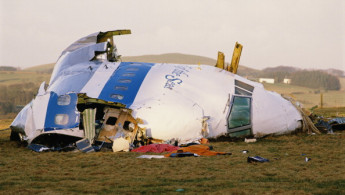Libyan bombing suspect to appear before US federal court
A Libyan intelligence operative suspected of making the bomb that blew up Pan Am flight 103 over Lockerbie, Scotland, in 1988 and killed 270 people will be arraigned in a US court on Wednesday, where prosecutors are also expected to ask for him to be detained through trial.
Abu Agila Mohammad Mas'ud Kheir Al-Marimi,71, is the first suspect in the attack to face criminal charges in the United States. He is scheduled to appear in a federal court in Washington.
The bomb exploded aboard a Boeing 747 over Lockerbie as it flew from London to New York in December 1988. All 259 people on board were killed, and another 11 people died on the ground.
The Justice Department has alleged that Mas'ud, who is from Tunisia and Libya, allegedly confessed his crimes to a Libyan law enforcement official back in September 2012.
It took many years for the FBI to piece together enough evidence before he could be apprehended and extradited to the United States.
In 1991, two other Libyan intelligence operatives, Abdel Baset Ali al-Megrahi and Lamen Khalifa Fhimah, were charged in the bombing.
At a Scottish trial before a court at Camp Zeist in The Netherlands, Megrahi was found guilty of the bombing in 2001 and was jailed for life. He was later released because he was suffering from cancer and died at his home in Tripoli in 2012.
Fhimah was acquitted of all charges, but Scottish prosecutors have maintained that Megrahi did not act alone.
In a 2020 criminal complaint, Mas'ud was charged with destruction of an aircraft resulting in death and destruction of a vehicle used in interstate commerce by means of an explosive resulting in death. He was formally indicted on those charges in November 2022.
Prosecutors do not intend to seek the death penalty because it was not legally available at the time the crimes were committed.
(Reuters)





 Follow the Middle East's top stories in English at The New Arab on Google News
Follow the Middle East's top stories in English at The New Arab on Google News
![The UAE is widely suspected of arming the RSF militia [Getty]](/sites/default/files/styles/image_330x185/public/2024-11/GettyImages-472529908.jpg?h=69f2b9d0&itok=Yauw3YTG)
![Netanyahu furiously denounced the ICC [Getty]](/sites/default/files/styles/image_330x185/public/2024-11/GettyImages-2169352575.jpg?h=199d8c1f&itok=-vRiruf5)
![Both Hamas and the Palestinian Authority welcomed the ICC arrest warrants [Getty]](/sites/default/files/styles/image_330x185/public/2024-11/GettyImages-2178351173.jpg?h=199d8c1f&itok=TV858iVg)